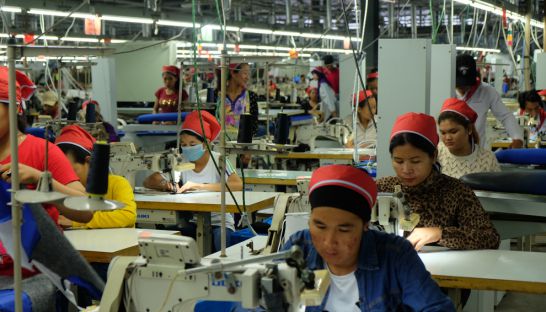Cambodia: Garment sector torn over wage hike
Both the hike in the garment industry minimum wage and the recent political deterioration, perceived as a threat to the future of democracy in Cambodia, have received mixed responses from international businesses operating in the Kingdom’s lucrative garment sector. While some of the largest apparel giants sourcing from Cambodia have shown widespread support for the wage increase, smaller companies lament the anticipated loss of profitability and all businesses fear increased political tensions.
The latest minimum wage boost passed last month for garment workers will increase monthly wages from $153 to $170 in 2018, an 11 percent year-on-year increase. But most garment giants seem untroubled by the potential loss of overheads incurred by the salary hike.
Ulrika Isaksson, press officer for Swedish company H&M, said that the brand welcomed the new law, claiming the company is in favour of higher minimum wages to support garment workers.
“We are positive [toward] the raise of the minimum wage and welcome a regular and transparent minimum wage setting process for the Cambodian garment industry,” she said in an email.
Rebecca Maund, senior brand and corporate public relations manager of British retailer Debenhams, responded similarly.
“Debenhams is working with a number of global brands, retailers and trade unions to help achieve living wages for workers in Cambodia,” she said.
While these corporate giants with their vast resources are responding positively, smaller companies which face less global scrutiny are less optimistic about their future profitability.
Eric Tavernier, CEO of French-based textile firm We Group Ltd, admitted the increase in the minimum wage has made him question continuing operations in Cambodia.
He argued that the new wage law would see the Kingdom lose its edge in an already competitive sector, adding that his factory in China is three times more efficient and his factory in Vietnam has better oversight, shipping and market flexibility than his Cambodian facility.
“We can’t increase prices for our customers, because competition is intense,” he said. “Now, if I place my factory in Cambodia, it’s not cheaper [than setting up a factory in a neighboring country]. I can go to Myanmar or Bangladesh or Vietnam.”
While Tavernier does not have immediate plans to shutter his Cambodian factory, a further increase in political tensions as the national election draws near could see him pull his investment.
“I worry about the next six months, about shootings in the streets and riots. At first I was very scared when I read the political news in Cambodia, but now I think we will just close,” he said. “It’s a big punishment to the country [for factories to shutter operations], and I’m not saying I’m expecting to close my Cambodian factory yet, but I am concerned.”
Tavernier is not alone in his fears, as the actions taken over the last several months by the government have drawn condemnation from businesses and rights groups which believe a financial squeeze could influence the ruling party.
A joint global statement from the Clean Clothes Campaign, Workers Rights Consortium (WRC) and International Labor Rights Forum released last month pleaded with Western apparel giants sourcing from the Kingdom to take a stance against the recent political crackdown.
The statement cited three trends of escalating political repression as grounds for multinational corporations to make a stand in Cambodia. These included the unjustifiable arrest of opposition leader Kem Sokha in September on charges of treason, the forced closure of NGOs and the silencing of independent media outlets preceding a heated election year.
Jessica Champagne, the WRC deputy director for field operations and strategy, said that she had already been in touch with several businesses, but none had yet agreed to take a unified stance against the overall political decline in the Kingdom.
“We are in discussion with a number of the key brands sourcing from Cambodia,” she wrote in an email. “We hope that they will send a clear message calling on the Cambodian government to fully respect human rights and workers’ rights.”
Globalised apparel companies have been making moves to raise human rights standards in the garment industry for years through organisations like the Ethical Trading Initiative (ETI) and the International Labour Organization’s Better Factories Cambodia programme.
However, these businesses are not known to engage in politics outside their sector of operations.
While ETI’s Executive Director Peter McAllister said he believes overall political stability is important for investment in Cambodia, none of the goals pushed forward by the organisation have tackled brewing political uncertainties raised by the WRC.
“It is important to allow NGOs, trade unions and other civic institutions to operate freely and effectively so that they can make a positive contribution to the wider business environment,” he said.
Individual firms from ETI’s 17 members in Cambodia have voiced alarm over the political climate.
“We’re deeply concerned by the ongoing political situation in Cambodia,” said Gap Inc representative Laura Wilkinson.
Katrin Ehrenberg, communication specialist for global apparel company C&A, said that the political climate could force the brand to source elsewhere.
“It is certainly an option to move production out of Cambodia if the current situation does not improve,” Ehrenberg said. “Our main aim is to continue working in the country, but we are extremely worried about the actions taken by the government.”
Source: http://www.phnompenhpost.com/business/garment-sector-torn-over-wage-hike


 Thailand
Thailand




